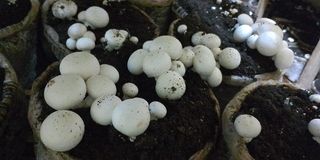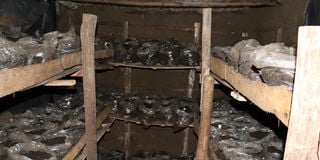25-year-old who faced unemployment now thriving in mushroom farming

Mushroom farming has gained popularity in Nakuru.
“Mushroom farming is not a venture that allows mediocrity,” says 25-year-old Harrison Oketi.
The BSc in Crop Improvement and Protection graduate who started the venture in January 2023 due to unemployment, is determined to make the delicate fungi flourish and loop more people in to meet its demand.
Mushrooms have been consumed as food since time immemorial. Then, it would be collected mostly from the forests.

Harrison Oketi holds one of the packed mushrooms at his farm in Ngata on May 21, 2024.
Now, farmers like Harrison have devised a way to grow the fungi all year round in a low-cost, dark, ventilated hut made of thatched grass and mud- known for maintaining temp whether daytime or night time- where arable land is not required but virgin soil is.
“After graduating from university, my attempts to secure employment were unsuccessful. I turned to online writing, but faced with the increasing influence of artificial intelligence and the intense competition it has promoted, I decided to venture into something new that would make me money.”
Oketi narrates how he got intrigued by the exotic crop. To quench his curiosity, he visited Kamwangi in Gatundu, Kiambu County, where he found a trainer.

Mushrooms growing in a room inside Harrison's farm in Ngata on May 21, 2024.
“For two days, I learned the ins and outs of the two most consumed varieties (white button and oyster) and, after my trip, decided to set up my white button mushroom farm,” he recalls.
Oketi says he started the business with about Sh. 80,000, which he he got from his curious but supportive parents. The total price was a bit low since he got wood for the structure from home and labour from his friends.
“During the first harvest we lost quite a bit of our produce due to a lack of a refrigeration facility as we waited for the market.”

The mud hut where Harrison plants mushrooms in Ngata.
His 5m by 2m grow house, which sits behind the busy road of Ngata, currently undergoing an expansion, cannot still meet the demand for this exotic crop.
The structure with shelves employed to maximize space can accommodate about 300 grow bags, he says.
Oketi mentions that he harvests between 7.5 to 10 kilograms of mushrooms in the morning and evening, which can earn him an average return of Sh. 240,000 per harvest (occurring every 6-8 weeks), as each 250 grams of the white button mushrooms fetches between Sh. 200 and Sh. 250.

Harrison weighs the mushrooms before packing it for sale on May 21, 2024.
He sometimes adds value to his mushrooms by drying them to extend their shelf life, which he says has negotiable prices with the buyer and tastes better compared to the freshly packed.
A spot check by Mtaa Wangu found a punnet of button mushrooms in one of the supply chain stores in Nakuru going for Sh. 349, which shows how profitable the tasty nutritious fungus is.
“Mushrooms are delicate and require proper care. One mistake can lead to massive losses if you’re not keen and are mediocre on the farm. Mediocrity will always make you get punished,” he says sternly.

Some of the packed mushrooms ready for sale.
Harrison’s biggest challenge has been his inability to meet the demand for the market, adding that mushroom farmers face competition from cheaply imported mushrooms from Rwanda.
Pests such as snails and fruit flies and diseases like bacterial blotch are additional challenges that he faces.


